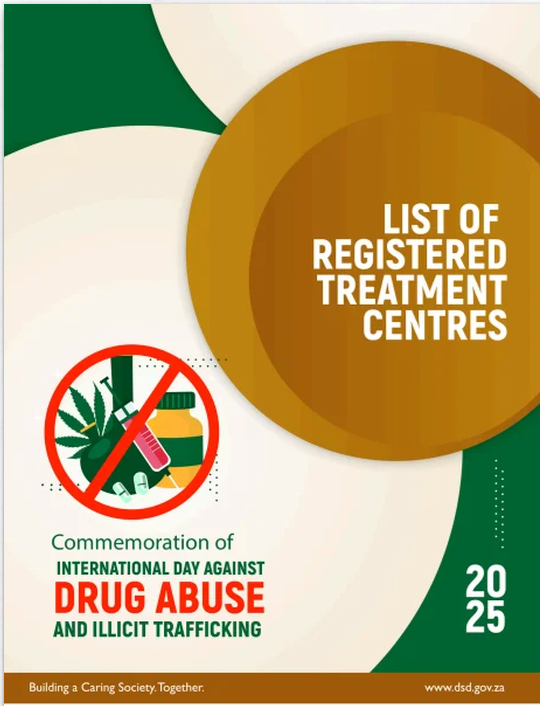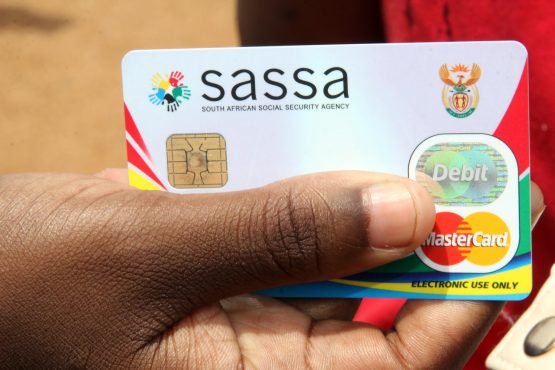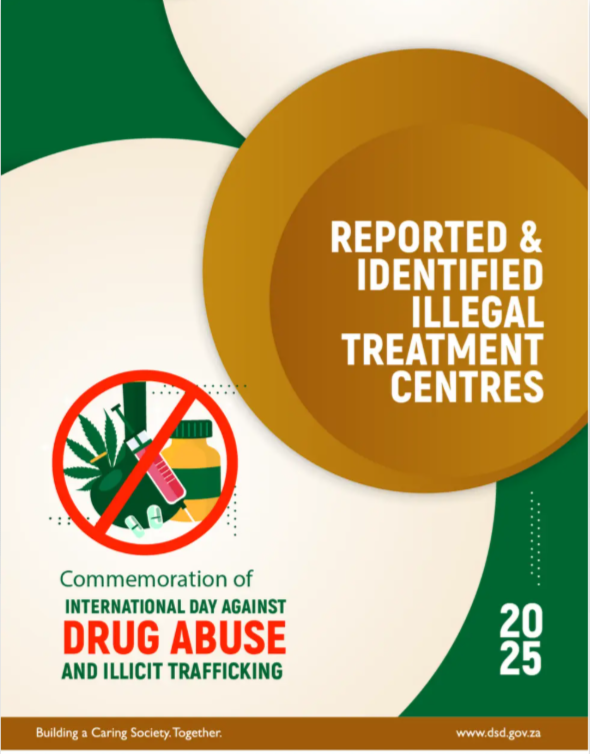Media Statement
Pretoria, 26 June 2021: Given the magnitude of the drug problem in the world which continues to destroy the lives of many South Africans, including the youth, the Department of Social Development joins the nations of the world to commemorate international day against drug abuse and illicit trafficking.
Drug abuse continues to present challenges to the health, safety, and well-being for all South Africans and this calls for a drastic change in overall societal behaviour and approach of addressing drug-related problems. The department, therefore, calls for an emphasis that should be placed on evidence-based public health and social justice principles focusing mainly on individuals, families, communities and society as a whole. Moreover on social protection and health care, not conviction, punishment and discrimination of drug users.
The illicit trade in psychoactive drugs and criminal enterprise remains a threat to the safety and well-being of South Africans and poses a growing and significant hazard to national security, economic growth, and sustainable development. New evidence describes addiction as a disease that affects both the brain and behaviour, shedding new light on our understanding of drug use and the appropriate response. As such, a constant long-term usage of psychoactive substances could change the structure of the brain over time.
It is in this context that every year on 26 June, the Department of Social Development in partnership with various stakeholders, commemorates the International Day against Drug Abuse and Illicit Trafficking to create awareness and educate communities about the impact of substance abuse and its related challenges on individuals, families and communities.
The United Nations Office on Drugs and Crime (UNODC), an International Agency Network for Demand Reduction, Drug Control and Crime Prevention; annually decides on a theme for the International Day against Drug Abuse and Illicit Trafficking. The commemoration of this day is also known as World Drug Day, which is on 26 June, and will this year unfold in the form of a virtual National Debate led by the Minister of Social Development under the theme; “My Mental Health, My Investment. This theme means that substance abuse is a brain disease, and therefore, the country needs to invest on young people by ensuring that they live their lives without drugs.
The Commemoration of International Day against Drug Abuse and Illicit Trafficking was initiated by the United Nations General Assembly in its resolution 42/112 of 7 December 1987. This day serves as a reminder of the goals agreed to by Member States of creating an international society free of drug abuse. This year, the international theme for the day is; “Share Facts on Drugs. Saves lives,” which emphasise the importance of awareness of the facts on drugs and their associated dangers, evidence-based prevention, treatment and care.
On a legislative front, the Prevention of and Treatment for Substance Abuse Act No 70 of 2008, mandates the Department of Social Development to develop programmes and support initiatives aimed at the prevention and treatment of substance abuse. The Department this week has been conducting Provincial dialogues on alcohol and cannabis.
While South Africans are using the same types of drugs as the rest of the world, the following drugs are deemed to be more popular in the country:
- Alcohol is the most widely used psychoactive substance in the country. In South Africa, about 58% of deaths on South African roads can be attributed to alcohol consumption.
- Cannabis is by far the most used illicit drug on South African streets, specifically among youth. This is a mixture of mandrax and marijuana which is street named White Pipe and is a widely used drug in South Africa; and
- Nyaope/whoonga, a mixture of heroin and cannabis as well as methamphetamine (tik) use has gained popularity among adolescents, with far-reaching effects on users, families and communities.
New Psychoactive Substances (NPS), referred to as designer drugs or legal highs, are also emerging on the local drug scene and the usage of psychoactive substance can interfere with the way nerve cells normally send, receive, and process information. Some psychoactive substances, like marijuana and heroin activate neurons that reduce the effect of natural neurotransmitters in the brain.
Alcohol consumption which is more common among men than women, remains the substance with the greatest burden of harm. The per capita consumption of alcohol in South Africa is 11 litres (95% CI: 9.6-12.4). This ranks in the top twenty per-capita alcohol consumptions worldwide for individuals drinking alcohol and is the highest consumption in Africa.
It is estimated that Six in 10 men (61%) and one in four women (26%) aged 15 and older drink alcohol. People who consume high levels of alcohol are more likely to engage in risky sexual behaviour, for instance multiple sexual partners; inconsistent condom use; coercive sex or rape and transactional sex.
Alcohol and drug use during pregnancy also poses potential health risks to pregnant women themselves and to their babies, even in the absence of substance use disorders. All pregnant women are advised to refrain from drinking alcohol as it increases potential health risks to themselves and their unborn babies. As a result, alcohol during pregnancy causes Foetal Alcohol Syndrome which impacts negatively on child development, child emotional and behavioural functioning and parenting skills.
Cannabis is the second most widely used drug in South Africa and its usage is widespread amongst all age and income groups. Hydroponic and indoor produced Cannabis is also on the rise amongst the youth and affluent communities. A newly emerging trend in use is the smoking or eating of different forms of Tetrahydrocannabinol (THC) – a rich resin extracted from the Marijuana plant. Users refer to this practise as ‘dabbing wax’ or ‘honey.’
Alcohol and Cannabis are the drugs of choice amongst youth and many young people are experiencing the consequences of drinking alcohol at an early age; resulting into underage drinking is a leading public health problem in this country. Each year, approximately 5,000 young people under the age of 21 die as a result of underage drinking; this includes about 1,900 deaths from motor vehicle crashes, 1,600 as a result of homicides, 300 from suicide, as well as hundreds from other injuries such as falls, burns, and drownings.
Research has also shown that many adolescents start to drink at very young age. In recent times, the average age of first use of alcohol was about 14 years. It has been established that that the younger children and adolescents who start to drink at an early age, are more likely to engage in behaviors that harm themselves and others persons living around them. For example, frequent binge drinkers, which comprises of high school students nationwide are more likely to engage in risky behaviors, including using other drugs such as marijuana.
Children who begin to drink at a very early age (before age 12) often share similar personality characteristics that may make them more likely to start drinking. Young people who are disruptive, hyperactive, and aggressive—often referred to as having conduct problems or being antisocial—as well as those who are depressed, withdrawn, or anxious, may be at greatest risk for alcohol problems. Other behavior problems associated with alcohol use include rebelliousness, difficulty avoiding harm or harmful situations, and a host of other traits seen in young people who act out without regard for rules or the feelings of others.
Continued drinking may lead to physiological reactions, such as depression or anxiety disorders, triggering even greater alcohol use or dependence. In this way, youthful patterns of alcohol use can mark the start of a developmental pathway that may lead to abuse and dependence.
In general, the abuse of substances, especially alcohol and cannabis affects mostly the young people and continues to have programs geared towards supporting young people. June is also Youth month and the country is commemorating Youth Month activities under the theme; “The Year of Charlotte Maxeke: Implementing sustainable youth development programmes for the South Africa we want.”
ISSUED BY THE NATIONAL DEPARTMENT OF SOCIAL DEVELOPMENT
For media enquiries please contact Ms Lumka Oliphant on 083 484 8067 or This email address is being protected from spambots. You need JavaScript enabled to view it.





